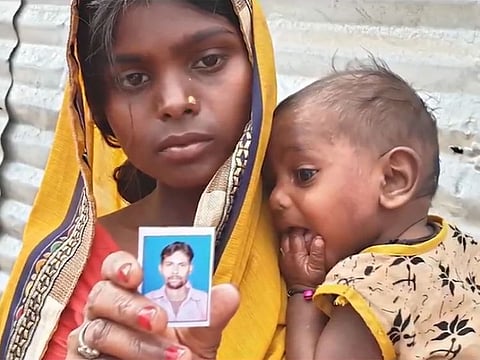Coronavirus: Indian migrant worker sells phone for Rs2500 (Dh120) to feed family amid COVID-19 lockdown, then kills himself
Coronavirus: India lockdown was extended till May 3, the worst affected are India's poor

He had no money to feed his family of six. Last week, Mukesh Mandal, a 30-year-old migrant worker, sold his phone for Rs2,500(Dh120) to feed his family and then committed suicide, in the Indian state of Haryana.
Popular Indian journalist, Barkha Dutt (@BDUTT) shared a video of his family that was already dealing with abject poverty before India's nationwide lockdown that saw many migrant workers lose their daily source of income.
Mukesh who had already lost his job ahead of the lockdown, was earning by doing odd jobs in the area as a painter. Unable to provide for his family, he was frustrated to a point that he felt compelled to end his life. After selling his phone, Mandal bought a fan, some essential food supplies for his family, paid off remaining debts and hung himself on a bamboo pole inside their small hut. His wife who was not in the same room at the time, came to know about the incident a few minutes later, according to Dutt's video.
Mukesh Mandal is only one of the millions of poor migrant workers, affected by India's lockdown that has been extended till May 3. While the economy, businesses and daily life is affected for many, it is the daily wage workers who are left with no source of income to buy basic food and medicines to sustain.
As the video caught the attention of Indian Twitterati, many users have shared concerns about how the country will deal with the problem that is facing the country's internal migrant workers. Some criticised the Indian government’s decision to shut down without enough notice.
Tweep @HinduKush87 wrote: "Four hours’ notice to shut down a nation of a billion. No planning, no thought, no strategy. Look at this suffering. Mobilise the military."
An April 15 article by scroll.in, an Indian news website, reported: " Hundreds of these daily-wage earners are now confined to the garbage- and excreta-laden shores of the river near Kashmere Gate, less than 10 km from where Prime Minister Narendra Modi delivered a televised speech telling Indians why a three-week nationwide lockdown aimed at containing the coronavirus epidemic had to extended by another fortnight... No one has earned a rupee since March 21 – the last day work was permitted in Delhi before the lockdown began. Their meagre savings have run out. With transport shut, they have no way to get back to their families in villages across North India."
Earlier reports say that the central government has announced direct cash transfers and food subsidies to help the people. However, Mandal's family, like many others say have said that they have received nothing or too little so far.
The International Labour Organization (ILO) said last week that 40 crore (400 million) Indians working in the informal economy risk falling deeper into poverty during the coronavirus lockdowns.
Sign up for the Daily Briefing
Get the latest news and updates straight to your inbox






